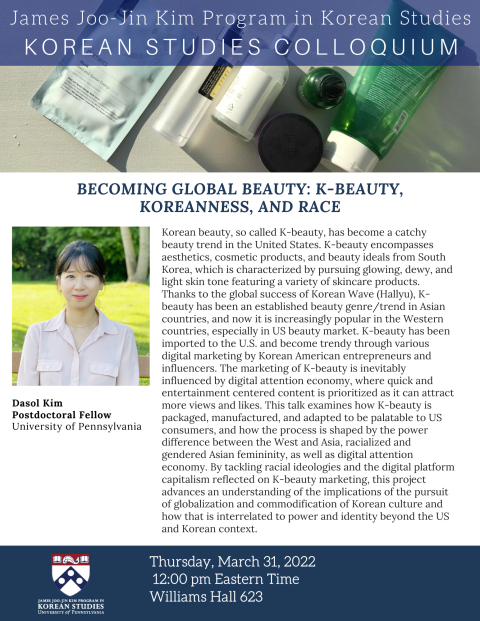
Korean Studies Colloquium
Williams Hall 623
Korean beauty, so called K-beauty, has become a catchy beauty trend in the United States. K-beauty encompasses aesthetics, cosmetic products, and beauty ideals from South Korea, which is characterized by pursuing glowing, dewy, and light skin tone featuring a variety of skincare products. Thanks to the global success of Korean Wave (Hallyu), K-beauty has been an established beauty genre/trend in Asian countries, and now it is increasingly popular in the Western countries, especially in US beauty market. K-beauty has been imported to the U.S. and become trendy through various digital marketing by Korean American entrepreneurs and influencers. The marketing of K-beauty is inevitably influenced by digital attention economy, where quick and entertainment centered content is prioritized as it can attract more views and likes. This talk examines how K-beauty is packaged, manufactured, and adapted to be palatable to US consumers, and how the process is shaped by the power difference between the West and Asia, racialized and gendered Asian femininity, as well as digital attention economy. By tackling racial ideologies and the digital platform capitalism reflected on K-beauty marketing, this project advances an understanding of the implications of the pursuit of globalization and commodification of Korean culture and how that is interrelated to power and identity beyond the US and Korean context.
Dasol Kim is a postdoctoral fellow at the Center on Digital Culture and Society (CDCS) at the University of Pennsylvania’s Annenberg School for Communication. She studies issues of race and gender in digital media spaces, with a special focus on influencer culture, platform economy, and the transnational connection between East Asia and the US. Her work has been published in the International Journal of Communication and Information, Communication and Society.
 James Joo-Jin Kim Center for Korean Studies
James Joo-Jin Kim Center for Korean Studies